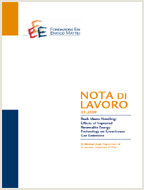Adaptation for Mitigation

10.12.2014
Masako Ikefuji, Jan R. Magnus, Hiroaki Sakamoto
D91, Q54, Q58
Climate Change, Mitigation, Adaptation, Human Capital
Climate Change and Sustainable Development
Carlo Carraro
This paper develops a dynamic model consisting of two regions (North and South), in which the accumulation of human capital is negatively influenced by the global stock of pollution. By characterizing the equilibrium strategy of each region, we show that the regions’ best responses can be strategic complements through a dynamic complementarity effect. The model is used to analyze the impact of adaptation assistance from North to South. It is shown that North’s unilateral assistance to South (thus enhancing South’s adaptation capacity) can facilitate pollution mitigation in both regions, especially when the assistance is targeted at human capital protection.
***
Suggested citation: Ikefuji, M., J. R. Magnus, H. Sakamoto, (2014), ‘Adaptation for Mitigation’, Nota di Lavoro 102.2014, Milan, Italy: Fondazione Eni Enrico Mattei.
